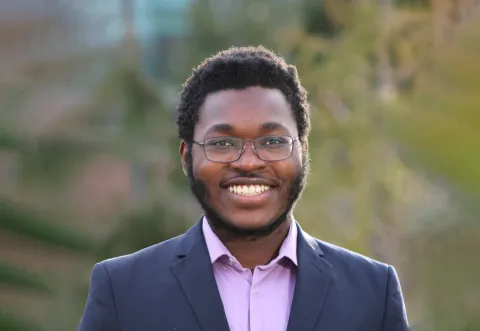"One of the things I really appreciated about the Computer Engineering program is how it introduces you to a lot of topics in many different areas."

Penjani Chavula
- Degree:
- Bachelor of Applied Science
- Grad year: 2021
- Program:
- Campus: Vancouver
Job title as of 2023: Web Developer at Fortinet
Why did you want to study engineering?
I’ve been into math and physics for as long as I can remember, but I always knew I wanted to go into something applied rather than just focusing on pure math or physics. For awhile I wanted to study mechatronics engineering and focus on robotics. That was before I realized that a whole side of robotics, and engineering in general, involves working with computers.
Why did you choose Computer Engineering?
When I went into first-year engineering I wanted to specialize in mechanical engineering. But after the first programming course I took, I realized I really enjoyed working with computers. Some of the projects we did in first year, like the autonomous claw, helped solidify my interest in computer engineering.
Tell us about your career since graduation.
After graduating, I began working with RBC Capital Markets on a library used by fixed income traders to assess and valuate the risk associated with certain trades. I then got a job offer from Fortinet, which is a cybersecurity company that I’ve worked at ever since. I’m working on one of Fortinet’s main products, which is a networking device for organizations to protect their networks and users. I’m working on the FortiOS team as a full stack developer.
What would you like to achieve as an engineer?
Honestly, just getting to continue doing what I’m doing, working on projects and fixing issues that directly impact customers – and helping them stay secure – is what I want to continue trying to do. The more I keep doing the work I’m doing now, the more high-impact work is going to come my way.



